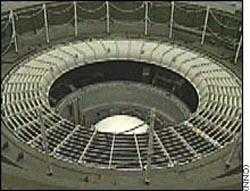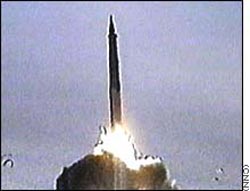 |
 |
International Affairs
The China Threat. Where Is the Response?
Toby Westerman
July 7, 2005 - As China builds its military and commercial muscle, "the next superpower" is also becoming increasingly brazen toward the government of the United States, especially to the Congress of the United States.
On July 4th, U.S. Independence Day, the Chinese Foreign Ministry issued a "demand" that the Congress forget national security concerns and meekly allow UNOCAL's sale to Chinese interests. "We demand that the U.S. Congress correct its mistaken ways…" and "stop interfering in the normal commercial exchanges between enterprises of the two countries," according to Agence France-Presse.
Congress recently voted 398 to 15 on a non-binding resolution to block UNOCAL's sale to the China National Offshore Oil Corporation (CNOOC), but the Chinese Foreign Ministry regards congressional concerns about the security of U.S. oil supplies as political interference.
China's remarks, framed in terms of a near ultimatum, drew surprisingly little response, even from the conservative media.
Unlike the United States, there is no strict dividing line in China between the private sector and the government. The communist ruling elite in Beijing actively support China's business expansion around the world, with the profits largely financing the stunning growth of the Chinese military.
Although small compared to the U.S., China's nuclear arsenal is growing, and its land and sea forces are increasingly formidable. China is already becoming the dominant military as well as commercial power in Asia.
Beijing's ownership of UNOCAL will ensure that the Chinese military-industrial complex remains well greased.
China's appetite for petroleum products is voracious, extending to Canada, the Central Asian nation of Kazakhstan, and Iran, where Beijing and Teheran recently signed a 200 billion-dollar natural gas agreement - in direct opposition to U.S. sanctions.
China is also involved in oil exploration partnership with the African nation of Sudan, whose government is frequently accused of genocide against its Christian and animist population in the south and west of the country.
China needs oil for its military expansion, which will eventually challenge the U.S. in the Pacific and elsewhere.
At present, China's top priority is the subjugation of the democratically ruled nation of Taiwan, by intimidation or direct invasion. Any attack on Taiwan, a traditional friend of the U.S., must include the ability to either deter or destroy American forces which could be sent to aid the besieged island.
Some experts predict that China could have the ability to invade Taiwan and significantly threaten the United States in two years.
China does not have to completely defeat the U.S., but simply have the strength to intimidate U.S. politicians and the American public into submission to China's will.
China's interests, however, are not limited to Asia. For many years China has operated a spy and cyberwarfare base in Bejucal, Cuba, and is allied with the Marxist government of Hugo Chavez in Venezuela, the world's sixth largest oil producer and a major oil supplier to the U.S.
One Hong Kong firm with close ties to the Chinese government operates one of the world's largest container ports in Freetown, Bahamas. China is extending its reach throughout Latin America, constructing military and trade alliances with many of the nations of Caribbean, Central and South America.
China's espionage services aggressively support Beijing's quest for military and commercial domination. Recent defectors from China's diplomatic and academic sectors have revealed a massive espionage effort to acquire military and commercial secrets. Over one thousand individuals aid China's spy efforts in Canada, and China's espionage services are attempting to use their influence and connections to dominate Australia's foreign policy.
FBI counterintelligence estimates that over 3,000 Chinese "front" companies operate in the U.S. - businesses that appear to be legitimate but in reality are part of China's military or espionage services. Thousands of individuals, including students and business representatives, also may be induced by the Chinese communist government to spy on U.S. interests while in America.
There is also a pro-China presence in the CIA and on the White House National Security Council staff.
As the threat of China's power grows, the U.S. cannot depend on help from Russia to act as a counterbalance against Beijing. Following the collapse of the Soviet Union in 1991, the idea was advanced that Moscow would need American assistance in halting China's expansion into Russian territory. The belief was that the "new" Russia would gladly join with the United States against a projected expansion of Chinese power into Russian territory.
This optimistic foreign policy assessment was shattered when Russian President Vladimir Putin and Chinese President Hu Jintao met in Moscow in late June. Not only did Putin and Hu settle old border disputes, but also proclaimed their mutual cooperation in regional and international affairs, and prepared the way for the upcoming Sino-Russian military exercises.
The attempt to purchase UNOCAL is only one instance of China's determination to become a world power and challenge the United States. China remains a communist state and, as China's power grows, there is no indication that the Communist Party is losing its grip.
The survival of the United States and its freedoms depend upon the ability of the nation to face and overcome this challenge. The war in Iraq, Supreme Court nominations, even a missing - and possibly murdered - girl in Aruba, are important news, but they cannot be allowed to distract from one of America's most important challenges - the growing strength of Communist China.
Pollitical leaders and the public must act now to avert the loss of American independence. Patriotism is more than speeches and mutual congratulation.

Nuclear machines are to be used in any situation Russia deems critical for its national security |
Critics in the West "are accusing Russia of all possible sins…human rights violations, unnecessary use of force in Chechnya…the clamping down on the mass media…allegedly excessive concentration of state power, doctored elections…the Kremlin's imperial ambitions," VOR complained.
In response to demands from the Bush administration and others that Moscow acknowledge Soviet Cold War oppression in the Baltic States (Lithuania, Latvia, Estonia) and Eastern Europe, VOR added that critics want Russia to "apologize to almost the whole world for certain Soviet-time transgressions."

A multi million-dollar project being developed is the Topol-M nuclear missile |
All who cite Moscow's current or past oppression are adhering to the "Cold War idea," and "the longer they [Moscow's critics] exert influence in real term politics, the more difficult it will prove to be to build the strategic partnership of Russia and the West," asserted VOR.
Moscow treats all charges of election fraud, media manipulation, government authoritarianism, or human rights violations as completely unworthy of direct response, but the Moscow elite only issue ominous warnings of Cold War sentiments. Condemnations from human rights or free press groups leave Moscow unfazed.
Moscow appears to be demanding that criticism of its policies cease and a virtual "Party line" be accepted without question, or another Cold War may result.
Despite Moscow's lamentable record on personal freedom and its continuing support of anti-American regimes -- including nuclear-tipped North Korea -- the Bush administration views Russia as a vital ally in the war on terror and a strategic partner.

Posted June 8, 2005
Toby Westerman publishes
International News Analysis - Today
An investigative and uncompromising weekly analysis of the world situation
Contact T. Westerman at
www.inatoday.com
or P.O. BOX 5182, Rockford, ILL, 61125-0182
|
International Affairs | Hot Topics | Home | Books | CDs | Search | Contact Us | Donate

© 2002- Tradition in Action, Inc. All Rights
Reserved
|
 |
|